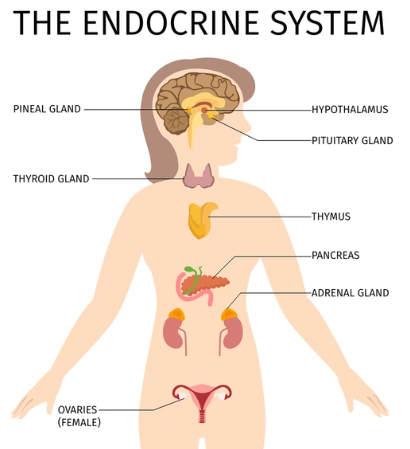Pregnancy involves significant hormonal changes as the body adapts to support the developing baby. Disorders of the endocrine system can arise during this time, affecting both maternal and fetal health. Here’s an overview of common endocrine disorders in pregnancy, including their causes, symptoms, and treatment options.
Gestational Diabetes
- Definition and Causes:
- Gestational diabetes is a type of diabetes that develops during pregnancy and usually resolves after delivery. It occurs when the body cannot produce enough insulin to meet the increased needs during pregnancy, leading to elevated blood sugar levels.
- Symptoms:
- Many women with gestational diabetes do not experience noticeable symptoms. However, some may experience increased thirst, frequent urination, and fatigue.
- Management and Treatment:
- Monitoring: Regular blood glucose testing is essential to manage blood sugar levels.
- Dietary Changes: A balanced diet with controlled carbohydrate intake can help regulate blood sugar levels. Working with a dietitian can provide personalized meal plans.
- Exercise: Regular physical activity helps improve insulin sensitivity and control blood sugar levels.
- Medication: If lifestyle changes are insufficient, insulin injections or oral medications may be prescribed.
- Postpartum Care: Blood glucose levels should be monitored after delivery, as women with gestational diabetes are at higher risk for developing type 2 diabetes later in life.
Thyroid Disorders
- Definition and Causes:
- Thyroid disorders, such as hypothyroidism (underactive thyroid) and hyperthyroidism (overactive thyroid), can affect pregnancy. Hypothyroidism can be due to autoimmune conditions like Hashimoto’s thyroiditis, while hyperthyroidism might be related to conditions such as Graves’ disease.
- Symptoms:
- Hypothyroidism: Symptoms include fatigue, weight gain, constipation, and cold intolerance.
- Hyperthyroidism: Symptoms include weight loss, rapid heartbeat, anxiety, and heat intolerance.
- Management and Treatment:
- Hypothyroidism: Treatment involves taking thyroid hormone replacement medications, such as levothyroxine. Regular monitoring of thyroid levels is essential to adjust medication dosages.
- Hyperthyroidism: Treatment options include medications to reduce thyroid hormone production, radioactive iodine, or sometimes surgery. Regular monitoring by an endocrinologist is important.

Adrenal Disorders
- Definition and Causes:
- Adrenal disorders during pregnancy can include conditions such as Cushing’s syndrome (excess cortisol) or Addison’s disease (insufficient cortisol production). These disorders can affect overall health and pregnancy outcomes.
- Symptoms:
- Cushing’s Syndrome: Symptoms include weight gain, high blood pressure, and mood swings.
- Addison’s Disease: Symptoms include fatigue, weight loss, and low blood pressure.
- Management and Treatment:
- Cushing’s Syndrome: Treatment may involve reducing cortisol levels through medications or surgery, depending on the cause.
- Addison’s Disease: Treatment typically involves hormone replacement therapy to manage cortisol levels.
Polycystic Ovary Syndrome (PCOS)
- Definition and Causes:
- PCOS is a common endocrine disorder characterized by irregular menstrual cycles, elevated androgen levels, and ovarian cysts. It can affect fertility and increase the risk of gestational diabetes.
- Symptoms:
- Symptoms include irregular periods, acne, excessive hair growth, and weight gain.
- Management and Treatment:
- Diet and Exercise: Maintaining a healthy weight and regular exercise can help manage symptoms and improve insulin sensitivity.
- Medication: Metformin may be prescribed to manage insulin levels, and hormonal contraceptives can regulate menstrual cycles.
- Fertility Treatment: If PCOS affects fertility, treatments such as ovulation induction may be considered.
Hyperemesis Gravidarum
- Definition and Causes:
- Hyperemesis gravidarum is a severe form of nausea and vomiting in pregnancy that goes beyond typical morning sickness. It can lead to dehydration and weight loss.
- Symptoms:
- Persistent nausea and vomiting, weight loss, dehydration, and electrolyte imbalances.
- Management and Treatment:
- Hydration: Intravenous fluids and electrolyte solutions may be necessary.
- Medication: Anti-nausea medications prescribed by a healthcare provider can help manage symptoms.
- Dietary Adjustments: Eating small, frequent meals and avoiding triggers can alleviate symptoms.
Conclusion: Disorders of the endocrine system during pregnancy can impact both maternal and fetal health. Regular prenatal care, monitoring, and appropriate treatment are crucial for managing these conditions effectively. If you experience symptoms such as unusual fatigue, significant weight changes, or persistent nausea, consult your healthcare provider. By working closely with your healthcare team, you can address these endocrine disorders and support a healthy pregnancy for both you and your baby.
